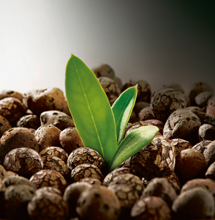Liapor: Europe-wide known for expanded clay
The expanded clay of the Liapor brand is produced in several European countries. The distribution of the expanded clay ball with its many advantages takes place all over Europe. The Liapor plant in Pautzfeld near Forchheim/Upper Franconia supplies mainly the German market with high-quality expanded clay by truck, rail and ship. Liapor has sales offices in Switzerland and the Netherlands. The Liapor Group also owns the only expanded clay plant in Austria, Lias Österreich Ges mbH. With a production facility in Fehring near Graz, the company has positioned itself excellently in the Austrian building materials market and is also increasingly supplying expanded clay to countries in Southeastern Europe such as Hungary, Slovenia, Bosnia-Herzogovina and Croatia. With the plant in Vintirov near Karlovy Vary (Northern Bohemia/Czech Republic), the Liapor Group has another production facility.
Born in fire
Only naturally pure, outstandingly high-quality clay is suitable for Liapor products. The clay, which dates back to the Liassic (early Jurassic) period and is up to 180 million years old, is not only particularly suitable for the manufacture of outstanding products but also gives them their name: Liapor. This natural raw material is obtained from restricted areas in a way that respects the landscape. Natural processes continue to be respected when the material is further treated to form Liapor clay spheres. Because the key element in the production process is fire. After careful preparation, the raw clay is fired in a rotary oven at a temperature of approximately 1,200 ∞C. At the same time, this burns off the evenly and finely distributed organic components in the clay. The clay spheres expand, resulting in the air-entrained ceramic Liapor expanded clay. Even in the case of a natural product such as Liapor expanded clay, it is possible to precisely control the weight, size and strength.
Lightweight and compression-resistant
Thanks to the natural clay properties of the raw material and the optimized production process, one cubic metre of clay is turned into up to five cubic metres of Liapor clay spheres – this efficient use of the raw materials makes an important contribution to environmental responsibility. Liapor possesses an ideal granular form: The surface is uniformly rough and closed. This encloses an even, fine-pored structure. Though low-weight, Liapor provides optimum particle strength and therefore constitutes an excellent building material.
Helping to preserve nature
This is the task that Liapor set itself right from the beginning. That is why it is self-evident that it respects the typical national materials standards such as DIN 4226 or the Austrian ÖNORM standard 13055-1. Areas from which the clay is extracted are replanted in the light of the latest scientific knowledge and regulations. Nature's loan is repaid in an ecologically valuable way. A little raw clay makes a lot of raw material. This is the vital formula for preserving the extraction sites. The lifecycle of this environmentally responsible, forward-looking building material passes through intensive production processes, flue gas scrubbing and on to the manufacture of easy-to-recycle, ready-made construction products.
